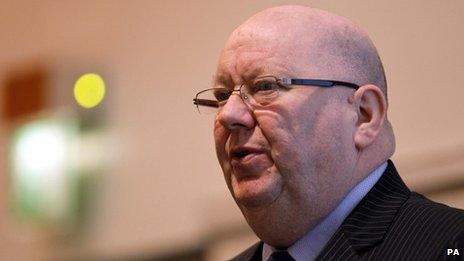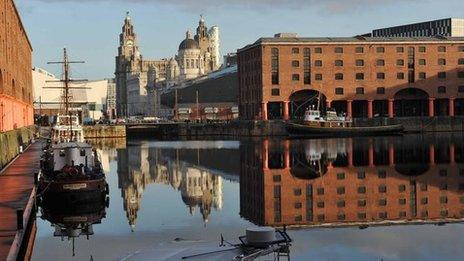Liverpool not being 'treated unfairly' says Cameron
- Published

The city's mayor has suggested Liverpool is being discriminated against
David Cameron has rejected claims that Liverpool is being treated unfairly in terms of government funding.
The prime minister said cuts to the city's Whitehall grants this year were no higher than the average in England.
He told BBC Radio Merseyside that the council had increased its overall budget this year and was also adding to its back-up financial reserves.
The city's mayor has invited ministers to take a look at its accounts, saying it is being "stabbed in the back".
Joe Anderson, former leader of the Labour-run council in Liverpool who was elected mayor last year, said the city had already had to make £176m in cuts and its budget was set to fall by a further £156m by 2018.
He claimed the city had been disproportionately affected by the budget squeeze across local government compared with councils in more prosperous areas, making it increasingly hard to fund services such as adult social care.
Mr Cameron said he accepted all councils were having to "do more with less" due to the tough financial climate and that Liverpool had higher levels of economic and social deprivation than many other areas.
But he said the statistics did not back up claims that Liverpool and other cities in the North West were bearing the brunt of the cuts.
"Is Liverpool being unfairly treated this year? I don't believe it is," he said.
Extra provision
Liverpool City Council was spending £21.7m more than last year, he said, while spending per household in Liverpool, would be £2,595 in 2014-15, compared with £1,874 per dwelling in west Oxfordshire, where he is an MP.
"It is important to make this point to show how fairly we manage things. Liverpool gets extra provision compared to the average."
"I am proud to be prime minister of a country that generously supports areas which have greater needs."
He added: "Spending power in Liverpool, a combination of council tax, grant and the money you get from business rates, is being reduced by 1.3% in 2013.
"That is absolutely the same as the average English reduction, which is 1.3%."
In a recent report, the local government spending watchdog said the majority of councils had coped well with the squeeze on their finances since 2010, by making efficiencies and reducing staff numbers, but warned things could get tougher.
Local Government Secretary Eric Pickles has urged councils with financial worries to dip into their reserves, money set aside for specific purposes and emergencies.
'Scaremongering'
The prime minister said Liverpool was "adding to its (financial) reserves while making these complaints not drawing on its reserves".
"If Liverpool city councillors are saying this funding is so unfair, why are they choosing to add reserves this year rather drawing on these reserves?
"They are being added to, not used."

Liverpool City Council is spending about £600m this year
More broadly, he said the economy in the north-west of England was improving, with unemployment down and business creation up but he admitted it would take time to recover from the worst recession for decades.
In an article for the Liverpool Echo, external, Mr Anderson said that "when Mr Cameron comes to praise Liverpool, he also plans on stabbing us in the back".
He told the BBC he was offering ministers the opportunity to look at the city's finances in an "open and transparent" way.
"We have made a request to you and Mr Pickles to visit Liverpool to see if we are scaremongering and creating political mischief, as has been suggested by him.
"We are not lying about it. We are just asking for fairness."
In response, Mr Cameron said he and his ministers visited the city regularly.
- Published28 November 2013
- Published14 November 2013